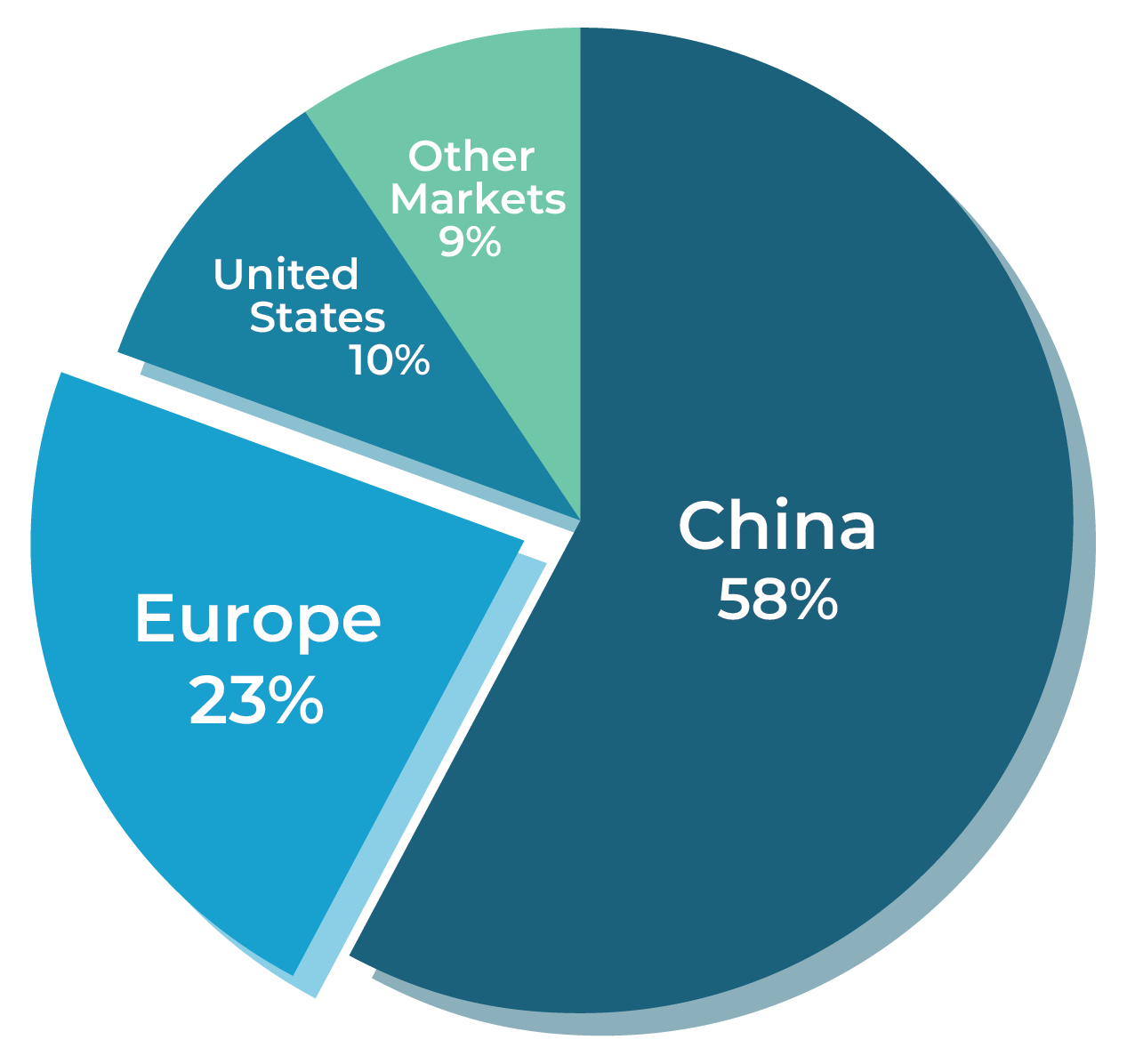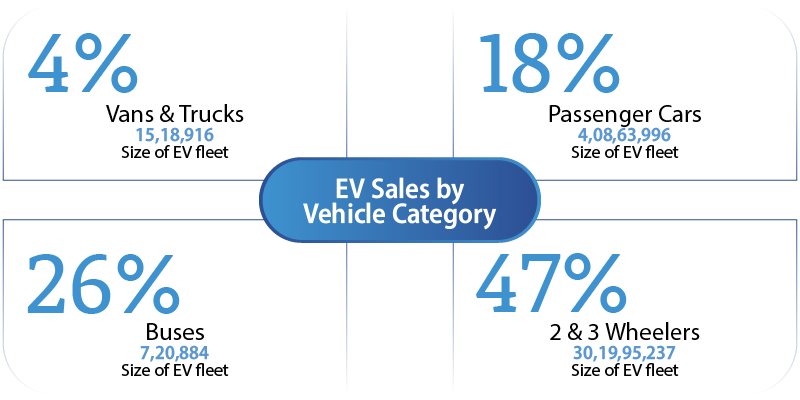Introduction:
The global electric vehicle (EV) industry is rapidly transforming transportation as the world seeks to combat climate change (environment and economic challenges). Fuelled by advancements in battery technology, growing consumer demand, and supportive government policies, EVs are becoming increasingly mainstream. Major automakers and innovative startups alike are investing heavily in electric mobility, aiming to redefine how we drive. With significant strides in charging infrastructure and sustainability, the EV sector is set to revolutionize the automotive landscape, making eco-friendly transportation more accessible and practical than ever before. As this shift accelerates, it promises a cleaner, more efficient future for global transportation.
Major Markets : Global Overview
In 2023, electric car sales surged, with 14 million new registrations globally, a 35% increase compared to 2022. This growth is indicative of a maturing market, with electric vehicles now accounting for approximately 18% of total car sales, up from just 2% in 2018. Notably, about 95% of these sales were concentrated in three major regions: China, Europe, and the United States.

- China
China continues to dominate the global EV market, registering 8.1 million new electric cars in 2023, representing nearly 60% of global sales. Despite the withdrawal of national subsidies for EV purchases, tax exemptions and provincial support remain, helping to sustain growth. By 2023, electric vehicles made up over one-third of all new car registrations in the country. Additionally, China exported over 4 million cars, including 1.2 million EVs, marking it as the largest auto exporter globally. - Europe
In Europe, new electric car registrations reached nearly 3.2 million in 2023, a year-on-year increase of almost 25%. The European Union saw 2.4 million of these registrations, with countries like Germany, France, and the United Kingdom leading the charge. Notably, Germany became the third country to register over 500,000 battery electric cars in a single year. However, the phase-out of purchase subsidies in Germany has impacted sales growth, causing the share of electric cars to decrease slightly from 30% in 2022 to 25% in 2023.- Notable statistics:
- Sweden: Electric vehicles accounted for 60% of new car registrations.
- Norway: Maintains the highest EV sales share in Europe at nearly 95%.
- Notable statistics:
- United States
The U.S. market saw 1.4 million new electric car registrations in 2023, a 40% increase from the previous year. The revised Clean Vehicle Tax Credit, along with price cuts on popular models, such as the Tesla Model Y, contributed to this growth. Despite concerns about potential bottlenecks due to stricter domestic content requirements under the Inflation Reduction Act (IRA), EV sales continued to rise, supported by leasing models that helped maintain affordability. - Emerging Markets
- India
In India, electric car registrations rose by 70% year-on-year to 80,000 units, driven by government incentives under the Faster Adoption and Manufacturing of Electric Vehicles (FAME II) scheme. However, electric vehicles still accounted for only about 2% of total car sales. The market is primarily supported by local manufacturers like Tata and Mahindra, who control 80% of the EV market. - Southeast Asia
- Thailand: Electric car registrations quadrupled to nearly 90,000, achieving a 10% market share. New subsidies and a growing presence of Chinese manufacturers, particularly BYD, have fuelled this growth.
- Vietnam: Despite an overall contraction in car sales, electric vehicle registrations reached 30,000, supported primarily by domestic manufacturer VinFast.
- India
- Latin America
In Latin America, electric car sales reached almost 90,000 in 2023, with Brazil leading with over 50,000 new registrations. This has led to increase by 88.7% as compared to previous year is significantly due to imports from China and the substantial influence of producers from China. The entry of Chinese manufacturers has significantly influenced this market. However, the historical reliance on ethanol fuels has hindered faster EV adoption.- Mexico: Electric car registrations rose to 15,000, benefiting from integration with the U.S. automotive market and emerging local manufacturing capabilities.
- Other Regions
In Africa, Eurasia, and the Middle East, electric cars remain rare, comprising less than 1% of total sales. However, in Jordan, the EV share is over 45%, supported by favourable import duties. In Uzbekistan, partnerships with Chinese manufacturers like BYD have begun to increase local production and sales.

Importance of Regulatory Compliance
Environmental Standards
Regulatory compliance is essential in the EV industry to meet environmental standards. Governments worldwide are setting stringent emissions regulations to combat climate change. Compliance ensures that manufacturers produce vehicles that are environmentally friendly and sustainable.
Market Access
Many countries require compliance with local regulations for market access. Non-compliance can result in hefty fines or restrictions on sales. Understanding and adhering to these regulations is crucial for companies seeking to enter or expand in different markets.
Consumer Trust
Regulatory compliance fosters consumer trust. As customers become more environmentally conscious, they prefer brands that adhere to sustainability standards. Compliance signals a commitment to quality and responsibility, enhancing brand reputation.
Incentives and Support
Many governments offer incentives for compliant manufacturers. This can include tax breaks, grants, and subsidies for EV production and infrastructure development. Compliance opens the door to financial support that can significantly benefit companies.
Challenges Facing the EV Industry
The EV industry faces supply chain disruptions, particularly concerning battery production. The demand for lithium, cobalt, and nickel has surged, leading to price volatility and sourcing challenges. Ensuring a stable supply chain is critical for manufacturers to maintain production levels.
The development of charging infrastructure remains a significant challenge. While urban areas may have more charging stations, rural regions often lack access. Expanding this network is vital for encouraging EV adoption, as range anxiety continues to deter potential buyers.
Despite increasing interest in EVs, misconceptions persist. Some consumers worry about battery life, charging times, and overall vehicle performance. Education and awareness campaigns are necessary to address these concerns and promote the benefits of electric vehicles.
As the EV market grows, competition intensifies. New entrants and traditional automakers are rapidly launching electric models. This saturation can lead to price wars and potential financial instability for some manufacturers. Differentiating products through innovation will be key to staying competitive.
The Future of the EV Industry
Technological Advancements
The future of the EV industry will be shaped by ongoing technological advancements. Improvements in battery technology, such as solid-state batteries, promise longer ranges and shorter charging times. These innovations will enhance the appeal of electric vehicles to consumers.
Sustainable Practices
As sustainability becomes a priority, manufacturers will increasingly adopt eco-friendly practices. This includes sourcing materials responsibly, reducing waste, and utilizing renewable energy in production. Consumers will continue to favour brands that demonstrate a commitment to sustainability.
Government Policies
Government policies will play a crucial role in the future of the EV industry. Continued support through incentives, infrastructure development, and stringent emissions regulations will accelerate adoption. Policymakers must balance economic growth with environmental responsibility.
Global Collaboration
The global nature of the EV industry calls for collaboration among countries, manufacturers, and research institutions. Sharing knowledge and resources can drive innovation and address common challenges. Collaborative efforts can lead to standardization in technology and infrastructure, benefiting the entire industry.
State-Led Initiatives
- United States:
The enactment of the Inflation Reduction Act has significantly facilitated the adoption of electric vehicles (EVs) by providing federal tax incentives aimed at strengthening the domestic supply chain for lithium-ion batteries. This legislative framework has enabled EV manufacturers, who often face substantial tax liabilities, to more easily source battery components and critical minerals through imports from various global markets. - China:
The Chinese government has implemented a range of frameworks and guidelines to support electric vehicle (EV) manufacturers in promoting sustainable, emissions-free transportation. As part of these initiatives, EV manufacturers in China are responsible for the collection, treatment, and disposal of batteries, thereby facilitating the development of recycling facilities and enhancing the overall sustainability of the EV ecosystem. - European Union:
The European Union has enacted Battery Directives to promote battery recycling and sustainability. These directives require electric vehicle (EV) manufacturers to provide essential information to EV owners regarding safety measures, battery maintenance, and disposal practices to minimize environmental impact. The EU Battery Regulation serves as a comprehensive framework aimed at enhancing safety, sustainability, and the recycling of batteries throughout Europe.
Conclusion
The global electric vehicle (EV) industry stands at a crucial crossroads, fueled by unprecedented growth and innovation. As automotive markets worldwide embrace electric mobility, driven by regulatory demands and changing consumer preferences, it’s clear that the shift towards sustainable transportation is gaining momentum. However, challenges like supply chain disruptions and the need for robust infrastructure must be tackled head-on.
The future of the EV industry will hinge on technological breakthroughs, sustainable practices, and effective government incentives, both fiscal and non-fiscal. Collaboration across borders will be essential to navigate these hurdles. Policymakers play a vital role in crafting strategies that not only address these challenges but also incentivize the widespread adoption of EVs. By doing so, they can help pave the way for a more sustainable global society, making electric vehicles a key component of our collective future. Together, we can energize the road ahead, steering towards a cleaner, greener planet.
Disclaimer
The information provided in this article is intended for general informational purposes only and should not be construed as legal advice. The content of this article is not intended to create and receipt of it does not constitute any relationship. Readers should not act upon this information without seeking professional legal counsel.



